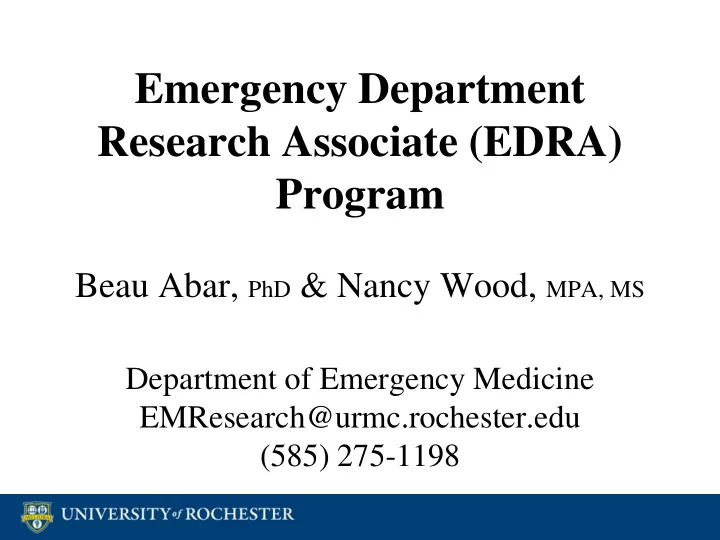

Emergency Department Research Associate (EDRA) Program Beau Abar, PhD & Nancy Wood, MPA, MS Department of Emergency Medicine EMResearch@urmc.rochester.edu (585) 275-1198
History In the mid-90s, influential EM researchers pioneered the use of undergraduate, pre-health profession students to enroll subjects into investigator-initiated research studies. Led to significant expansion of the scope of research performed in emergency medicine. URMC was a very early adopter of this model (1996).
History In the past 10 years alone, over 20,000 study participants have been enrolled by the EDRA program into a wide variety of research studies. Been responsible for URMC being among the top enrolling institutions in many of the recent multi- center ED studies in which we participate.
So who are we…
What do we do, and how do we do it? Our EDRA program is a university service center, with funding received from investigators Costs consist primarily of administrative effort, EDRA hourly wages, and training expenses, resulting in a fixed hourly rate for program utilization Our EDRAs are able to use the URMC EMR track- board to monitor characteristics of patients presenting to the ED Each login is monitored by hospital administration for appropriate usage
What do we do, and how do we do it? EDRAs use this tool to initially screen patients for eligibility EDRA sometimes contact a PI/coordinator to alert them of a potentially eligible patient Other times the EDRA to approach those patients who meet the inclusion criteria Introduce themselves/the study, answer any questions, determine capacity, and obtain document informed consent
What do we do, and how do we do it? Responsibilities of our EDRAs following consent are highly variable. Contact the contracted study team to hand off the consented patient Perform study procedures Administer surveys Obtain specimens (e.g., nasal swabs, saliva, blood) Perform brief interventions (e.g., brief motivational interviewing, referral to treatment).
So…are we any good? During same time period, program actively enrolled for an average of 8.98 studies at a time (range = 7 - 12). Importantly, across the wide variety of studies, we have demonstrated a 3 to 1 ratio of enrollments to refusals.
So… what is this gonna cost me? Our program does cost more than volunteers Relative to research assistants, we tend to be quite cost effective 16 hours a day/7 days a week Already trained and monitored Able to sign a contract and enroll within a week Umbrella RSRB approval
Recommend
More recommend